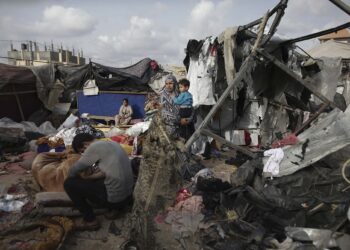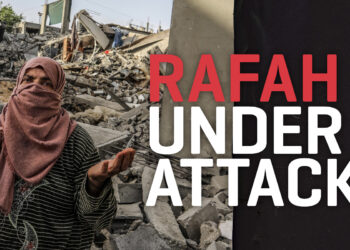Human Lives Human Rights: In the northern Gaza Strip, where the Israeli army has blocked humanitarian aid for approximately four months, animals are resorting to feeding on the deceased due to hunger.
Israel has been consistently attacking the Gaza Strip, home to 2.3 million Palestinians, for 118 days, blocking humanitarian aid, including food and medical supplies, to the besieged region.
In Gaza, under intense bombardment and a full blockade, Palestinians face challenges securing basic food as they witness animals perishing due to both attacks and hunger.
Gaza City and the Jabalia Refugee Camp in the north, severely affected by Israeli attacks, witness starving cats and dogs resorting to feeding on their own kind and other animals due to the inability to find food.
Palestinian Samih Zeyneddin, a resident of the Jabalia Refugee Camp, told Anadolu that Israel’s forced starvation policy has significantly impacted animals as well.
Zeyneddin said that the carcasses of numerous animals have gathered near waste collection areas, with some already decaying.
He explained, “Due to the lack of sufficient food in the Jabalia Refugee Camp and the entire northern region, both people and animals have been starving, leading to the death of these animals over the past few weeks.”
‘People face starvation’
Another Gaza City resident, Esma en-Neccar, told Anadolu that a cat roamed around a nearby garbage container, stating that the hungry animal was trying to satisfy its hunger by eating the carcass of its own kind due to the inability to find food.
Neccar expressed concern about the widespread starvation among both people and animals, saying, “People are on the brink of starving to death; now think about the animals.”
It is indicated that starving animals are turning to the corpses of people who died in Israel’s attacks but could not be retrieved from their locations.
Videos on social media also showed starving cats and dogs feeding on the corpses of Palestinians in Khan Yunis, where the Israeli army hindered ambulance access after their killings.
Palestinian vet builds shelters for cats
Palestinian veterinarian Aid Ebu Necm built a shelter for abandoned cats in southern Gaza’s Rafah.
Ebu Necm, stating that many cats have died either due to Israeli attacks or hunger, said, “The war Israel unleashed on Gaza killed not only people but also animals. Animals have also been affected by this great injustice.”
Ebu Necm, expressing that he distributes cat food, obtained with great difficulties, to the cats gathered in the shelter, mentioned that he protects the cats to return them to their owners after the attacks by the Israeli army.
He stated that, despite the high prices of cat food, he will make every effort to ensure that the animals he protects do not die.
Ebu Necm, condemning the cruelty animals face in Israel’s ongoing attacks, called for an end to the war to save the animals, especially cats that share strong bonds with humans in Gaza.
Israel uses hunger as a tool to force Gaza residents into displacement
Rami Abdu, President of the Euro-Mediterranean Human Rights Organization, stated in a recent interview with Anadolu, “Israel is using hunger as a weapon to force the people of Gaza into displacement.”
“Abdu highlighted the struggle to find basic food items in Gaza, mentioning a decrease in the number of aid trucks from 500 to 100.”
Abdu stressed the severe hunger in the region, saying, “People are dying of hunger. Over 500,000 Palestinians in Gaza face hunger, and the entire population is resisting the freezing cold wave.”
He highlighted that Israeli soldiers opened fire on Palestinians approaching limited aid vehicles from south to north Gaza, resulting in dozens of casualties.
He emphasized, “We are talking about a forced starvation policy, especially in northern Gaza, where children are the most affected.”
Israel has killed more than 27,000 people in the Gaza Strip in response to the Oct. 7 cross-border offensive by Hamas, which took the lives of 1,200 people and took 240 as hostages. The military onslaught has caused mass displacement and destruction and created conditions for famine.
A temporary truce in November resulted in a seven-day pause in the fighting in exchange for the release of more than 100 hostages by Hamas and about 240 Palestinian prisoners and detainees held by Israel.

















